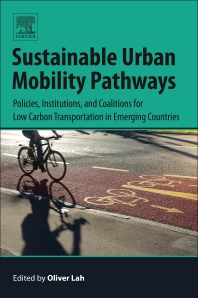Knowledge Hub
Policies to Reduce Fuel Consumption, Air Pollution, and Carbon Emissions from Vehicles in G20 Nations
2015
Author(s): Kodjak D
The transport sector consumes more than half of global oil production, and releases nearly a quarter of all anthropogenic carbon dioxide emissions.

This book examines how sustainable urban mobility solutions contribute to achieving worldwide sustainable development and global climate change targets, while also identifying barriers to implementation and strategies to overcome them.
Transportation Research Record: Journal of the Transportation Research Board is one of the most cited and prolific transportation journals in the world, offering unparalleled depth and breadth in the coverage of transportation-related topics.

A Platform for Personal E-Mobility With Route Forecasting
2020
Author(s): Kaya K, Poyrazoglu G
This study reports a new e-mobility platform to construct effective usage of charging points by electric vehicle users to eliminate long charge durations.
A Safety Oriented Decision Support Tool for the Remanufacturing and Recycling of Post-Use H&EVs Lithium-Ion Batteries
2020
Author(s): Gentilini L, Mossali E, Angius A, Colledani M
The battery is a key component of electric vehicles. Lithium-Ion batteries (LIBs) are the most competitive ones in terms of costs and performances for the near and mid future. To reach the needed voltage and capacity, single Lithium-Ion cells are assembled into modules, then assembled into the pack.
Two-stroke Autos in Bengaluru: Estimation and Status of Tailpipe Emissions
2018
Author(s): Thakur p, Pal S
Auto rickshaws play a crucial role in meeting the mobility requirements in Bengaluru city, and if switched to cleaner fuel technology-based solutions, these can contribute to the emission reduction within the city. This paper was developed by TERI and its objective is to estimate the vehicular emissions in the form of CO2, PM10, and NOx emitted by the auto-rickshaws plying in Bengaluru City.
Is the European automotive Industry ready for the global electric vehicle revolution?
2018
Publisher/Organisation: Bruegel
The automotive sector is currently at the centre of a global transformation, driven by four key trends - electrification, autonomous driving, sharing and connected cars. This Policy Contribution investigates the position of the European automotive industry and envisages that the industry will have to move into higher gear to meet the global – notably Chinese – competition. This policy contribution formulates a broad policy framework for the deployment and production of electric vehicles in Europe, combining demand and supply-side instruments. While Europe cannot follow China in the adoption of centrally-planned industrial policy measures, it can do more to stimulate the transformation of its automotive industry through more ambitious policies.
Proposed temporary management regulation for corporate average fuel consumption and new-energy vehicle credits for new passenger cars in China
2016
Publisher/Organisation: International Council on Clean Transportation (ICCT)
This Policy Update was rolled out in the context of the Chinese central government’s decision to phase out its decade-long subsidy program for NEVs in 2021. The proposal essentially would add a new NEV credit program to the existing corporate average fuel consumption regulation for passenger cars overseen by MIIT. The following summary provides an overview of the key elements of the proposal.
U.S. efficiency and greenhouse gas emission regulations for MY 2018–2027 heavy-duty vehicles, engines, and trailers
2015
Publisher/Organisation: International Council on Clean Transportation (ICCT)
On June 19, 2015, the U.S. Environmental Protection Agency (EPA) and the U.S. Department of Transportation’s National Highway Traffic Safety Administration (NHTSA) jointly proposed new standards to reduce the fuel consumption and greenhouse gas emissions of new heavy-duty vehicles, tractors, trailers, and engines. The new Phase 2 regulations would be implemented from model years 2018 to 2027, building upon initial standards that cover model years 2014 to 2018. This policy update provides a summary of some key aspects of the proposed rules.
Towards Smarter Service Provision for Smart Cities: Accounting for the Social Costs of Urban Service Provision
2018
Author(s): Markandya A, Sagar A, Shastry S, Goswami S, Ray I, Aziz Z, Paul S, Pai M, Tagat A, Chatterjee A
Through a case study of four Indian cities, this work examines the current unmanaged growth (business as usual urbanisation) and the costs associated with it. This paper has been jointly prepared by Indian Council for Research on International Economic Relations (ICRIER) and World Resources Institute (WRI) under the aegis of New Climate Economy the flagship project of The Global Commission on the Economy and Climate. The project has been overseen and led by Rajat Kathuria (Director & CE, ICRIER) and Ani Dasgupta (Global Director, WRI Ross Center for Sustainable Cities).



